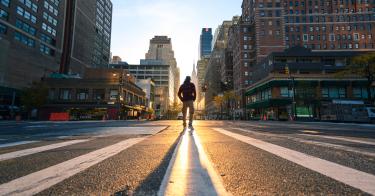Crises disrupt lives. They bring hardship and even tragedy. But they can also clarify what is truly important and bring out the best in humanity.
Americans have long enjoyed unprecedented levels of wealth. The astonishing array of goods, services and conveniences available to us has enabled us to solve or at least alleviate problems that previous generations considered intractable. Yet this multitude of blessings can also lead us to expect life to be painless and free from disappointment, tragedy and heartbreak.
Shocks like the pandemic now shaking society remind us of an unalterable truth: life is, indeed, hard. There will never be a time when we have conquered pain, suffering and misfortune once and for all. Ours is an imperfect world: bad things will inevitably happen.
Some may believe we have a right to be happy. But as our Declaration of Independence observes, “unalienable” human rights include only “the pursuit of Happiness,” not happiness itself.
There can be no guarantee we will attain happiness. It is not a gift that can be bestowed upon us, and no one can owe it to us as a right. On the contrary, happiness is an achievement. It takes hard work to achieve, and even with hard work it remains uncertain and even elusive.
In the United States, and throughout much of the rest of the world, businesses have shut down, schools have sent students home, and governments have restricted activities to only “essential” functions. As hard as this is on us, the need to distinguish what is “essential” from what is “non-essential” presents us with an opportunity.
It allows us to discover, for example, that some of the non-essentials are, in fact, luxuries. They include things we might like to do, or have, if we already have all the essential bases covered and have time and money to spare. In times of peace and plenty, we can convince ourselves that luxuries are actually necessities and we can find ourselves worrying about things that emergencies expose as not as important as we had thought.
So, what is truly important? Family. Friends. Taking personal initiative to help neighbors who need our help. When governments and businesses and the larger structures of society can no longer take care of the things they once did or claimed they would, the responsibility falls on us. Because our time, money, love and concern are limited, however, we cannot do everything we might like. So, we have to decide what is most important and put other things on a back burner.
The fact that life is hard does not mean that we should give up hope. On the contrary, crises give us an opportunity to step back and reevaluate our lives, to ask ourselves what truly matters and what does not, and to refocus our attention and reorder our lives according to what gives our lives genuine meaning and purpose.
Crises remind us that we are an active, not passive, species, and that work, industry and perseverance—even in the face of disappointment and defeat—are indispensable elements of a life worth leading. Indeed, what makes life most worth living is using one’s time, talent, and treasure in active service of worthy purpose. We often do not know what we are really capable of until we have faced the prospect of failure and have summoned the will to rise to the challenge.
Emergencies can remind us that a truly happy life is not comprised of idle passing of time, of momentary pleasure or of tepid contentment. It consists instead in striving and contending against an unforgiving, and sometimes merciless, world, and in finding joy in the small but profound graces of family, friends and neighbors who need one another.
Part of the dignity, even beauty, of humanity lies precisely in our ability to rise to the challenges we face. We join in solidarity with one another; we unite in service to one another, and we do not acquiesce in the face of even great hardship.
Yes, COVID-19 poses tremendous challenges and will leave too, too many tragedies in its wake. But we have overcome even greater challenges in the past. We will do so again. Because great challenge sparks energy, courage and perseverance, it summons faith and solidarity. And in so doing, it reveals the best of humanity.
This piece originally appeared in Fox News



